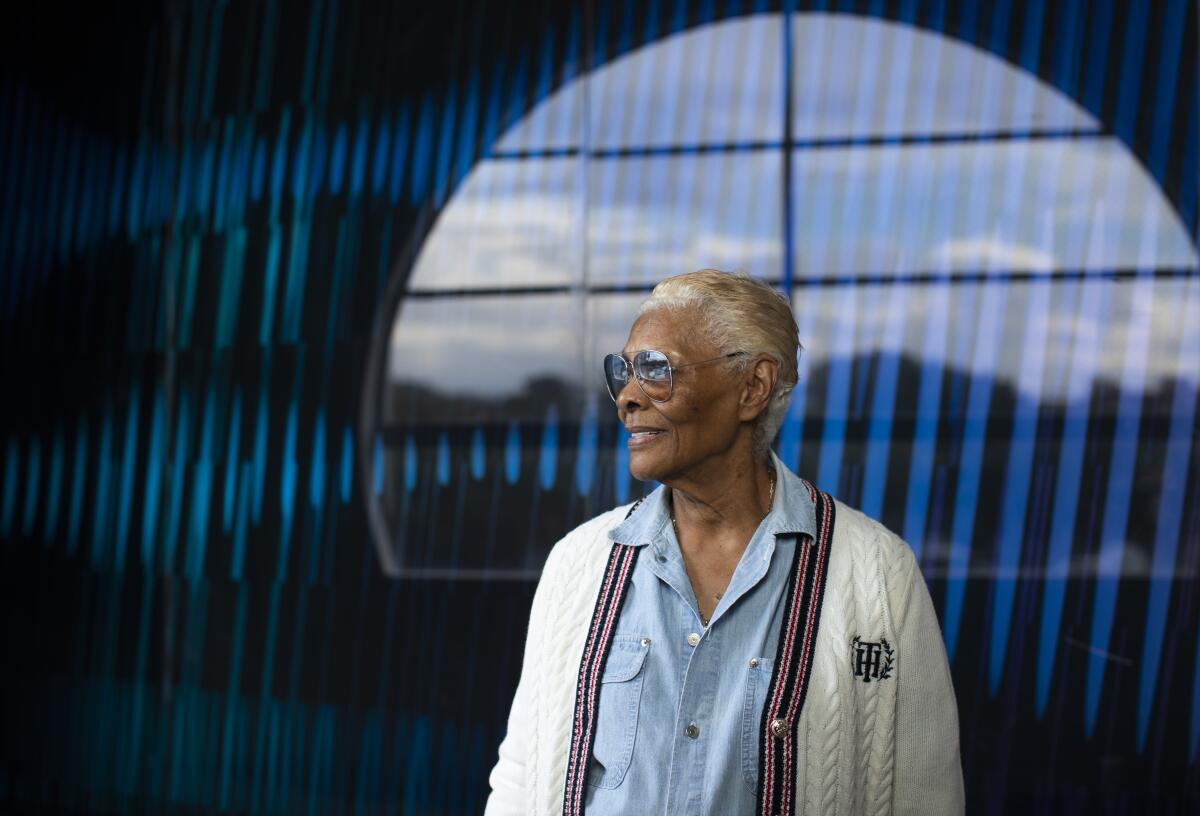Sacramento authorities expand use of controversial tech

- Share via
Good morning, and welcome to the Essential California newsletter. It’s Wednesday, Oct. 13. I’m Justin Ray.
The Sacramento County Sheriff’s Office announced it was expanding the use of technology that uses an algorithm to fight crime. The tech, called ShotSpotter, uses audio sensors in communities to detect shots fired.
“This technology greatly improves emergency response times getting deputies to the area in a tactically safe manner to assist the affected community and/or victims of gun violence,” the Sheriff’s Office said while announcing two additional areas where the tech would be used.
The technology has been controversial. The Associated Press and Vice published stories that questioned — among other things — the effectiveness of the technology. On Tuesday, it was reported that ShotSpotter was suing Vice Media for defamation, seeking more than $300 million in damages.
Here are the important things to know about the company.
Where did ShotSpotter come from, and how does it work?
The Silicon Valley start-up was launched 25 years ago and backed by venture capitalist Gary Lauder, whose family has amassed wealth from Estée Lauder cosmetics. Forbes reported that Lauder’s “involvement, strangely enough, grew out of his interest in maps.”
We don’t know the full details about the algorithm and its success rate, but here is what has been reported: The company uses powerful audio sensors placed at least 30 feet above street level, as the San Diego Union-Tribune has explained. Once the sensors pinpoint the location of the sound that may be a gunshot, the information is sent to a review center where employees of SST Inc., the for-profit company that developed the system, determine whether it was gunfire. If it is confirmed, the incident is forwarded to police.
How widely is it being used in America and California?
The technology has been installed in about 110 American cities, and it is possible that number may grow as cash-strapped safety agencies look for new ways to effectively use resources. At least 13 cities in California have implemented the technology, according to Shotspotter’s website. Those cities are Bakersfield, East Paolo Alto, Fresno, Oakland, Redwood City, Richmond, Sacramento County, Sacramento, Salinas, San Diego, San Francisco, San Mateo County and San Pablo.
Why is it controversial?
Critics of the tech say that at best it isn’t effective, and at worst, it isn’t reliable.
- The MacArthur Justice Center conducted a study that found that during a 21-month period in Chicago, 89% of ShotSpotter deployments resulted in no gun-related crimes and 86% led to no crime report.
- Helicopters, fireworks, construction, trash pickup, and other noises in the community have caused false alarms. The AP says those incorrect alerts — and incidents the technology missed — have caused cities like Charlotte, N.C., and San Antonio to end their contracts with the company.
- The tech is not cheap. The subscription fee for the service is between $65,000 and $95,000 per square mile per year. The steep cost raises questions about what sectors cities decide to place funding. A Fresno public school district has pulled funding for a ShotSpotter contract after paying $1.25 million over four years and finding it too expensive.
How has the company responded to criticisms?
The company has published a page on its website called “ShotSpotter Responds to False Claims.” On it, the company claims it “has a 97% accuracy rate, including a 0.5% false positive rate, for real-time detections across all customers over the last two years.” The company also says it has “earned trust and high renewal rates from many police departments because the system is proven to be effective in helping to save lives, collect critical evidence and make communities safer.”
Further reading:
Speaking of technology and policing, we published a story about how home security company Ring had an odd collaboration with LAPD officers. Emails reviewed by The Times reveal that officers who received free gadgets or discounts from the company promoted Ring products to fellow police officers or members of the public.
And now, here’s what’s happening across California:
Note: Some of the sites we link to may limit the number of stories you can access without subscribing.
L.A. STORIES
You thought the oil spill was bad? In L.A., toxic waste is everywhere. The Orange County oil spill is a big, visually compelling crisis that has brought out volunteers, donations and politicians discussing possible legislation. “But the slow, unseen toxins that have been and still are tainting land as well as sea have to go begging for attention and news coverage,” Patt Morrison says. “Between Los Angeles’ oil-pumping past and its half-century-plus as the factory of the world war and the Cold War, we have spilled and spread so much chemical poison into the earth beneath our freeways and our feet that by rights each of us should have two heads.” Los Angeles Times
She’s conquered music and Twitter. Now Dionne Warwick will help unblock your chakras. Grammy-winning singer Dionne Warwick has a voice that defined pop sophistication in the mid-1960s. She is really good at Twitter. She is also part owner of Ohm Zone, a combination recording studio, sound bath and meditation center opening in Venice. The Times caught up with the singer who discussed that venture, as well as her online persona and Saturday Night Live’s recurring bit about the legend. Los Angeles Times

Our daily news podcast
If you’re a fan of this newsletter, you’ll probably love our new daily podcast, “The Times,” hosted by columnist Gustavo Arellano, along with reporters from across our newsroom. Every weekday, it takes you beyond the headlines. Subscribe on Apple Podcasts and follow on Spotify.
POLITICS AND GOVERNMENT
Here are recent notable bills signed by Gov. Newsom. There have been a lot of bills that became law in the state. Some notable ones include a ban on the sale of new gas-powered leaf blowers and lawn mowers, a requirement that large department stores must display products like toys and toothbrushes in gender-neutral ways, and new laws to tighten security in the state’s unemployment system. KCRA
CRIME AND COURTS
San Luis Obispo will not be receiving its third storefront dispensary after its applicant pleaded guilty to crimes. Natural Healing Center’s permit application was initially granted, but it has now been denied. A man with the real, actual name of Helios Dayspring, 35, pleaded guilty to one count of bribery and one count of subscribing to a false 2018 tax return. According to the Department of Justice, Dayspring paid bribes in cash and money orders totaling $32,000 to a county supervisor in exchange for the supervisor’s votes and influence on other votes affecting his cannabis business interests. Mustang News
Support our journalism
HEALTH AND THE ENVIRONMENT
Rural clinics and hospitals bear the brunt of COVID misinformation. Rural areas in California with vaccination rates well below the state average are seeing higher death rates. The broad spread of misinformation about the safety of the vaccines is often cited as the reason for the low vaccination rate. This is all particularly problematic for rural health services that even before the pandemic saw closures and huge drops in revenue. That means many of the state’s rural residents struggle to obtain care and access to health information. Capital and Main
How hot is it inside Southern California’s warehouses? Ask the workers at Rite Aid. When Rite Aid Corp. decided to build a giant warehouse to serve its Southern California stores in 1999, it chose an isolated stretch of the Mojave Desert. The land was cheap. The freeway was nearby. But during summers, the workers are boiling inside the mostly non-air-conditioned warehouse. They say their leg muscles cramp and their hearts race. They sweat through their clothes. Made sluggish by the heat, they struggle to pull products at the pace the company sets, incurring demerits that threaten their jobs. Los Angeles Times
A fast-moving brush fire that broke out Monday afternoon north of Santa Barbara, burning more than 13,000 acres and shutting down the 101 Freeway, had firefighters on the offensive for much of the day Tuesday. The blaze — dubbed the Alisal fire — has displaced thousands of residents and is threatening roughly 100 homes, including some ranches, fire officials said. About 15 firefighters — among roughly 600 who are battling the blaze — gnashed at the bone-dry hillside with hoes and chainsaws as thick smoke billowed from just beyond the ridge. Los Angeles Times
CALIFORNIA CULTURE
Renew your service or we’ll trash your credit score, Spectrum tells ex-customer. Steve Schklair, an Altadena resident, received a strange letter from Spectrum saying that, “as a one-time courtesy,” the company will cancel debt it claims he owes and stop reporting him as a deadbeat to credit agencies — if he agrees to resume cable service. A Spectrum spokesperson confirmed the letter’s authenticity and called it “an opportunity to reconnect” with the cable company. “I’ve never before seen a pitch that so blatantly threatens harm unless you come around,” columnist David Lazarus writes. Los Angeles Times
Ted Sarandos’ Netflix memo on Dave Chappelle. The comedian’s latest special has caused a lot of controversy. Culture columnist Mary McNamara had a lot to say about a memo sent by the chief executive of Netflix, which is headquartered in Los Gatos, Calif. In it, Sarandos tells his staff that, while he understands many people are quite upset about the many homophobic and transphobic jokes, the show is a hit and Chappelle is very popular. “The first paragraph alone is a master class in psycho-villain monologuing,” McNamara writes. Los Angeles Times
Free online games
Get our free daily crossword puzzle, sudoku, word search and arcade games in our new game center at latimes.com/games.
CALIFORNIA ALMANAC
Los Angeles: Sunny, 76 San Diego: 75 San Francisco: Overcast, 63 San Jose: 66 Fresno: 73 Sacramento: 71
AND FINALLY
Today’s California memory is from Sean Gallagher:
Rather than go to our law school graduation, my good friend Paul and I took Amtrak to Canada and rode our bikes back to Santa Cruz along the coast. Washington was green and rain, rain and more rain. Oregon was all about logging truckers trying to run you over and crazy Winnebago drivers flipping us off. When we got to California we got off our bikes and kissed the “You are now entering the Golden State” sign.... but we still had to do the dreaded Leggett Hill climb, which Paul had said was longer than “the stairway to heaven.” Once over that hump it was a sunny beautiful coastline and tailwinds all the way to Santa Cruz. We were home!!!
If you have a memory or story about the Golden State, share it with us. (Please keep your story to 100 words.)
Please let us know what we can do to make this newsletter more useful to you. Send comments to essentialcalifornia@latimes.com.
Sign up for Essential California
The most important California stories and recommendations in your inbox every morning.
You may occasionally receive promotional content from the Los Angeles Times.







